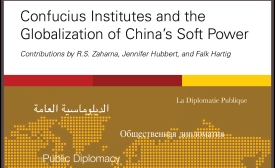confucius institutes
Beijing sees the Confucius Institutes as a way to promote its own soft power overseas, similar to the British Council or Germany’s Goethe-Institut. Yet recently, criticism has come hard and fast.
China’s effort to project soft-power has suffered another serious setback after a second US university in a week announced it would close its on-campus Confucius Institute because of an apparent disagreement over Chinese government controls.
China’s soft-diplomacy push hit a speed bump this week when the University of Chicago decided to pull the plug on renewing a controversial Beijing-funded Confucius Institute.The decision may prompt other universities to rethink their relationships with Confucius institutes – attractive because they offer free Chinese-language classes and cultural programs to cash-strapped colleges in the United States, albeit with limitations on what they can teach.

The latest edition of CPD Perspectives analyzes the globalization of China's Soft Power
Intended to boost China’s “soft power”, the centres take the name of the peace-espousing sage. They tap into growing global demand for Chinese-language teaching. But they are also fuelling anxiety about academic freedom.
Once lauded as the jewel in the crown of China's "soft power" cultural diplomacy, Confucius Institutes have sprung up at hundreds of colleges and teaching institutions around the world. Partnering with local academic centers, their aim is to teach people to speak Chinese, as well as broadening people's experience of Chinese culture in general. But a recent warning from a group of U.S. professors suggests some 90 Confucius Institutes across the U.S.
The American Association of University Professors is calling on universities to uphold principles of academic freedom by either terminating or renegotiating the agreements that have brought nearly 100 Chinese government-backed cultural and language programs called Confucius Institutes to campuses across the United States and Canada.







